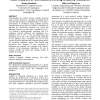Free Online Productivity Tools
i2Speak
i2Symbol
i2OCR
iTex2Img
iWeb2Print
iWeb2Shot
i2Type
iPdf2Split
iPdf2Merge
i2Bopomofo
i2Arabic
i2Style
i2Image
i2PDF
iLatex2Rtf
Sci2ools
113
Voted
CHI
2007
ACM
2007
ACM
Meta-analysis of correlations among usability measures
Understanding the relation between usability measures seems crucial to deepen our conception of usability and to select the right measures for usability studies. We present a meta-analysis of correlations among usability measures calculated from the raw data of 73 studies. Correlations are generally low: effectiveness measures (e.g., errors) and efficiency measures (e.g., time) have a correlation of .247 ? .059 (Pearson's product-moment correlation with 95% confidence interval), efficiency and satisfaction (e.g., preference) one of .196 ? .064, and effectiveness and satisfaction one of .164 ? .062. Changes in task complexity do not influence these correlations, but use of more complex measures attenuates them. Standard questionnaires for measuring satisfaction appear more reliable than homegrown ones. Measures of users' perceptions of phenomena are generally not correlated with objective measures of the phenomena. Implications for how to measure usability are drawn and commo...
CHI 2007 | Effectiveness Measures | Human Computer Interaction | Keywords Usability Evaluation | Usability Measures |
| Added | 30 Nov 2009 |
| Updated | 30 Nov 2009 |
| Type | Conference |
| Year | 2007 |
| Where | CHI |
| Authors | Kasper Hornbæk, Effie Lai-Chong Law |
Comments (0)

